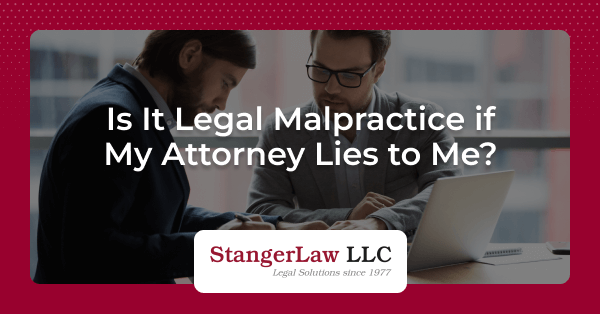Is It Legal Malpractice if My Attorney Lies to Me?

The bond between a lawyer and a client is built on trust and honesty. But what if that trust is broken? Can I sue my lawyer for lying?
In some instances, yes, you can sue your lawyer for lying. But while lying is unethical, it may not always give rise to a legal malpractice claim. You must speak with a Connecticut legal malpractice lawyer to determine your rights. You may have the right to sue for damages, but that is expensive in time and money to pursue it.
If you suspect your lawyer has been dishonest with you and you’ve suffered more than $100,000 in damages, contact StangerLaw LLC. If it is less, someone else may be willing to take it. Or, there is always the option of filing a grievance against the lawyer which may not get you compensation (they rarely award any money to the client who was wronged) but a bad apple should be dealt with.
Give us a call at (860) 561-0651 or send an online message today to get started.
Our Practice is Limited to Connecticut
We handle Connecticut legal malpractice claims. We won’t review cases where financial losses are less than $100,000.
Understanding a Lawyer’s Duties
Under Connecticut’s Rules of Professional Conduct, lawyers owe their clients a duty of honesty. They’re expected to represent clients diligently, competently, and truthfully. When your lawyer lied to you, it was a betrayal of trust. It goes against the fundamental principles that govern the attorney-client relationship.
When Can Lawyers Get in Trouble for Lying?

A lawyer can face consequences for lying, especially if the lie results in substantial financial harm to their client.
However, a lawyer’s dishonesty doesn’t automatically equate to malpractice. It depends on whether their misconduct led directly to a negative outcome in your case.
For example, imagine that opposing counsel made a settlement offer and your lawyer rejected it without telling you about it. Then later you lost your case or had to accept a much lower settlement offer.
In this scenario, you can likely sue your lawyer for malpractice.
How to Tell If Your Lawyer Is Cheating You on a Settlement
Deception regarding a settlement can take many forms.
It could involve withholding settlement offers, misrepresenting settlement amounts, settling without your consent, or even lying about the existence of a settlement offer.
It’s rare but there are instances where lawyers settled a case and did not tell the client, with the lawyer keeping all the money. It’s essential to stay informed about your case’s progress. It could be a red flag if your lawyer is reticent, vague, or appears dishonest.
Pursuing a Legal Malpractice Claim
If you suspect your lawyer has lied to you and you’ve suffered significant financial loss, there are several steps you can take:
- Communicate with your lawyer. Address your concerns directly with your lawyer. It could be a misunderstanding or communication issue.
- Get a second opinion. Consult with another attorney to evaluate the situation from a fresh perspective.
- Consider arbitration or mediation. Before filing a lawsuit, with a lawyers assistance consider dispute resolution methods such as arbitration or mediation.
- Hire a different lawyer. If your lawyer is dishonest, it might be time to seek a new legal representative.
Remember, not every dishonest action by a lawyer amounts to a case worth bringing for legal malpractice. But when it does, you deserve to seek justice. A legal malpractice claim might be worthwhile if you sustained significant financial harm as a result of your lawyer lying to you.
Contact StangerLaw LLC Today
If you believe you’ve been a victim of legal malpractice due to your lawyer’s dishonesty, it might be time to seek professional advice. Experienced Connecticut legal malpractice attorneys can guide you in navigating this challenging situation, ensuring your rights are protected and you receive the justice you deserve.
If you have questions about whether you can sue your lawyer for lying and if your damages exceed $100,000, contact StangerLaw LLC.
We know the value of relationships and the importance of trust, loyalty, and open communication. Please schedule an initial consultation so we can review your case and explain the best course of legal action.
Contact us online today or call (860) 561-0651 for a no-obligation consultation.